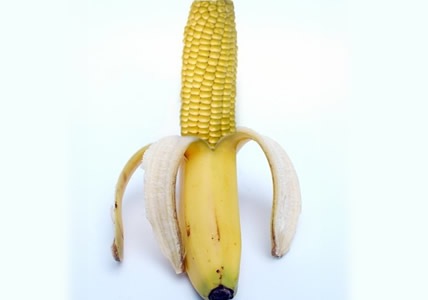First Human Trials of Genetically Modified Bananas Underway
JULY 15, 2014
by DAVE MIHALOVIC
The Queensland University of Technology (QUT) had previously signed an agreement with India's department of biotechnology to invest in a four-year project to develop GMO iron-rich bananas . Now, a researcher at the QUT has led a scientific effort to create GMO bananas with funding from the Bill and Melinda Gates Foundation. The world's first human trial of pro-vitamin A-enriched banana is underway in the United States.

The QUT project, led by Professor James Dale and backed with close to $10 million from the Bill and Melinda Gates Foundation, is claimed to be one of the most prominent biofortification projects in the world today.
"Human trial is a significant milestone for this project which started in 2005 and should see pro-vitamin A-enriched banana varieties being grown by Ugandan farmers around 2020," Professor James Dale said.
Somewhere in Iowa, volunteers are earning $900 apiece by providing blood samples after eating bits of a banana kissed with a curious tinge of orange.
The researchers inserted the new genes at their laboratory in Brisbane, grew the trees at a field station on the northeastern coast of Australia, then harvested the fruit, froze them and flew them to Iowa. Because they are genetically modified, the bananas required special permits from the U.S. Department of Agriculture to enter the country.
If the experience of similar "biofortified" crops is any guide, this banana faces a path strewn with obstacles and uncertainty.
More than a decade ago, for instance, researchers created a kind of "golden rice " with high levels of beta carotene -- and immediately found themselves in the middle of controversy. In the Philippines, anti-biotech activists destroyed a test plot of the genetically engineered grain. When researchers carried out a feeding trial of golden rice in China, using children as subjects, it turned into a national scandal. The researchers were denounced for not disclosing, in all cases, the fact that the new rice was genetically engineered. No government has approved widespread cultivation of golden rice.
The trial in Iowa is not likely to stir up similar controversy. Yet Wendy White, the researcher at Iowa State University who is carrying it out, is reluctant to discuss it. In an e-mail to NPR, she wrote that disclosing details about the study "could preclude me from publishing our findings in a peer-reviewed scientific journal."
Even if, as expected, the Iowa experiment confirms that beta carotene in the bananas does boost vitamin A levels in the volunteers' blood samples, this doesn't mean that the "super banana" really is a solution to the problem of vitamin A deficiency in Uganda.
Many regulatory and practical obstacles remain. For the banana to have any impact at all, governments would have to approve it, farmers would have to grow it, and ordinary people would have to be persuaded to eat orange-tinted bananas.
Several studies also point out to the need for further, detailed investigations. It is ironical that the scientists promoting GMOs do not want to look at specific research and deliberately try to avoid discussions on scientific footing . They should understand that they will drive a nation into a deep and irreversible crisis related to food and farming if they continue this blinkered approach.
It is a much broader and deeper issue which the industry and GM proponents want to circumscribe in the name of science. In that context there is enough evidence against this technology.
Sources: